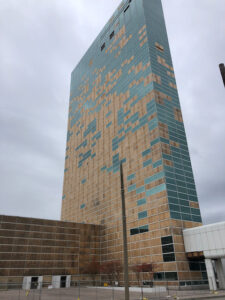
The Capital One tower in Lake Charles, Louisiana, still missing most of its glass after the hurricanes.
It is 72 degrees and raining again in Lake Charles. It has been raining off and on for days. There is an ongoing mosquito infestation, despite two US Air Force C-130s bombing the city with insecticide.
Lake Charles, Louisiana, a city of 78,000 on the Gulf Coast, was hit directly by two hurricanes this fall. The first, Laura, was the strongest hurricane ever to make landfall in Louisiana, and the tenth-strongest to hit the United States. The second, Delta, set a new record as the 25th named Atlantic storm for the 2020 season. Damage from both storms was predicted to cost $11-20 billion.
Power lines are back up over the 48 square miles of the city, and the debris and massive trees are out of the roadways. Garbage collection resumed quickly, and the first collection of curbside piles of vegetation has been done. There are expected to be several more rounds of collection for the remaining tons of demolition debris, cut-up trees, stumps, and piles of garbage bags. This does not take into account the thousands of damaged or destroyed buildings, the wind-drift litter everywhere, and signage hanging loosely from poles, which all must be dealt with before the city looks even remotely as it did on August 28th.
“We really just need people not to forget about us,” Lake Charles Mayor Nic Hunter told CNBC during Delta. “We are going to be in the recovery mode for months and probably years from these two hurricanes. It’s just unprecedented and historic what has happened to us.”
Despite everything, holiday spirit is in the air, and there is much busyness this Christmas week. Traffic is bumper-to-bumper on north Nelson Road, which runs past an elementary school, strip malls (Yoga Y’All), a Walmart Supercenter, and up to the Golden Nugget and L’Auberge casinos. The Tobacco Plus gas station and shopping mart was destroyed and is just a construction trailer now, with a drive-through window for smokes and liquor, but it is busy.
The new Avail Hospital, “a first-of-its-kind, concierge-level healthcare facility,” is off this stretch of Nelson Road. It is so busy that a police car blocks a lane of traffic to allow easier entrance and exit. The policeman stands on the sidewalk, watching a woman in a Santa hat wave and twirl a sign at the end of the drive, as if the medical facility is a carwash.
With so much physical devastation and misery in the city, and with Christmas only days away, it must be hard to think about how Covid has killed 7,226 in Louisiana. Sixty-eight died in the last day, the highest figure in five months, and there are some 3,000 new infections. The National Guard is at the Lake Charles Civic Center, doing testing. The parish (county) is at the “Highest Risk,” according to the Louisiana Department of Health. Every parish in the state is. The CDC has been pleading with people to stay home for the holidays.
Yet all the business parking lots on Nelson Road are full, and the Waffle House is masklessly packed.
I called Avail Hospital to ask if they had someone I might ask about their recent efforts for the community, as a new hospital, in a difficult time.
“Huh?” the woman at the front desk said.
“Do you have anyone who could speak to the media? The press?” I said. “I’d like to ask about the challenges of Covid.”
“No,” was all she said.
